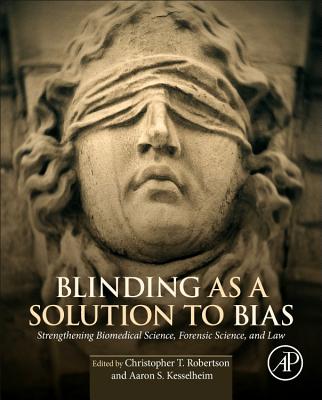

 Academic Press
Academic Press
Blinding as a Solution to Bias: Strengthening Biomedical Science, Forensic Science, and Law


Key Metrics
- Christopher T Robertson
- Academic Press
- Hardcover
- 9780128024607
- 9.3 X 7.6 X 1 inches
- 2.2 pounds
- Law > Forensic Science
- English
 Secure Transaction
Secure TransactionBook Description
What information should jurors have during court proceedings to render a just decision? Should politicians know who is donating money to their campaigns? Will scientists draw biased conclusions about drug efficacy when they know more about the patient or study population? The potential for bias in decision-making by physicians, lawyers, politicians, and scientists has been recognized for hundreds of years and drawn attention from media and scholars seeking to understand the role that conflicts of interests and other psychological processes play. However, commonly proposed solutions to biased decision-making, such as transparency (disclosing conflicts) or exclusion (avoiding conflicts) do not directly solve the underlying problem of bias and may have unintended consequences.
Robertson and Kesselheim bring together a renowned group of interdisciplinary scholars to consider another way to reduce the risk of biased decision-making: blinding. What are the advantages and limitations of blinding? How can we quantify the biases in unblinded research? Can we develop new ways to blind decision-makers? What are the ethical problems with withholding information from decision-makers in the course of blinding? How can blinding be adapted to legal and scientific procedures and in institutions not previously open to this approach? Fundamentally, these sorts of questions--about who needs to know what--open new doors of inquiry for the design of scientific research studies, regulatory institutions, and courts.
The volume surveys the theory, practice, and future of blinding, drawing upon leading authors with a diverse range of methodologies and areas of expertise, including forensic sciences, medicine, law, philosophy, economics, psychology, sociology, and statistics.
Author Bio
Christopher Robertson joined the BU Law faculty in 2020 as a tenured professor and N. Neal Pike Scholar in Health & Disability Law. Robertson previously served as associate dean for research and innovation and professor of law at the University of Arizona.
Professor Robertson is an expert in health law, institutional design, and decision making. His wide-ranging work includes torts, bioethics, professional responsibility, conflicts of interests, criminal justice, evidence, the First Amendment, racial disparities, and corruption.
In 2019, Harvard University Press published Exposed: Why Our Health Insurance is Incomplete and What Can be Done About It. Robertson has co-edited three books, Nudging Health: Behavioral Economics and Health Law (2016), Blinding as a Solution to Bias: Strengthening Biomedical Science, Forensic Science, and Law (2016), and Innovation and Protection: The Future of Medical Device Regulation (forthcoming 2021).
Acting in legal reform movements, in 2020 Robertson undertook a yearlong project to help the board of trustees of the California State Bar reduce racial disparities in the attorney discipline system. He previously served as reporter for the Health Law Monitoring Committee of the Uniform Law Commission. For over a decade, he has served on the clinical ethics committee of an academic medical center.
Working to reform legal education, Robertson is leading the development of JD-Next, a national program designed to reduce disparities in preparation for law school and to provide a more reliable predictor of student success. In its second year, the program enrolled over 1100 students nationwide. With ETS, Robertson also conducted the first major study of the validity of the Graduate Record Exam (GRE) as an admissions test for JD programs, which led to 60+ schools, including Harvard, Yale, and BU now relying on the exam. Robertson has also pioneered legal education for undergraduates and non-lawyer professionals.
Professor Robertson has served as a visiting professor at Harvard Law School, NYU Law, and the London School of Economics, and as a visiting scholar at the Brown University Policy Lab. He is affiliated with the Petrie Flom Center for Health Care Policy, Bioethics and Biotechnology at Harvard, the NYU Langone Health Working Group on Compassionate Use and Pre-Approval Access (CUPA), and the University of Arizona’s Innovation for Justice program. Robertson’s legal practice has focused on complex litigation involving medical and scientific disputes, and he continues to work with litigators through his firm, Hugo Analytics.
Source: Boston University
Videos




Community reviews
Write a ReviewNo Community reviews